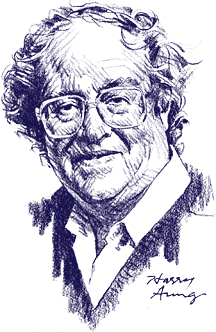I was sad to read of the recent death of John Mortimer — playwright, author, bon vivant and barrister. Here’s the story of my own extremely distant connection with him.
I never had much luck applying for internships in college. Part of it was, I’m sure, the times (the late ’70s and early ’80s were almost as brutal a time in publishing as the present) and part of it was my own belief that self-promotion was uncool and my talents spoke for themselves. But my junior year I did finally land an internship reporting and writing for the American Lawyer monthly — something I now recognize as a startup company led by a young journalist named Steven Brill. My heart lay in writing arts criticism, but I had a good head for investigative reporting and I knew a little about the law, so I took the job and got a few clips, and got to know a colorful (and incredibly talented) gang of future luminaries like Jim Cramer, Jill Abramson, James Stewart, Connie Bruck and many others.
I wrote stories about lawyers and law firms, but I really wanted to write about playwrights and artists. So when I started freelancing full time after graduation I pitched the editors at American Lawyer with ideas for pieces about the occasional overlap cases — people like Louis Auchincloss and John Mortimer. In 1982 Mortimer’s wonderful autobiography Clinging to the Wreckage had just come out in the US, and Mortimer was doing interviews in NY, so I got to meet him. He decided that our interview should take place at Maxwell’s Plum, the legendary but by then (to me) tacky East Side cafe and singles bar, because he’d once set a scene in a story there but had never actually set foot inside. So the tape of my otherwise delightful interview with this drily charming subject was rendered nearly untranscribeable by the loud chatter of the surrounding wannabe-socialite gaggle. At that stage of my career I was still sometimes intimidated by the prospect of interviewing writers I admired; Mortimer was the kind of conversationalist who got me over that generously and quickly. The American Lawyer piece from 1982 isn’t online but a second interview I did with him years later, at Salon, still is.
Here’s Charles McGrath’s Times appreciation. McGrath, like nearly every other obit writer, reminds us of Mortimer’s label as a “champagne socialist,” one that he embraced. He may have lived just long enough to see its utility return for a new era of cheerful crusading on the left.
Post Revisions:
- January 23, 2009 @ 12:29:26 [Current Revision] by Scott Rosenberg
- January 23, 2009 @ 12:28:54 by Scott Rosenberg

